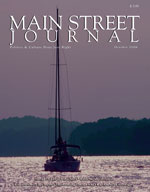The following article is an excerpt from our October issue. For more political coverage by the leading conservative magazine in West Tennessee, subscribe now.
By Jonathan Lindberg
In Sumner County, in the heart of rural Tennessee, Harold Ford Jr. has rolled up his shirt-sleeves and is making his stump-speech. The Sumner County Democrats are having a summer picnic, though the atmosphere feels more like a revival service. Wooden benches and slow-moving fans. A corded microphone with which Ford struggles. “It is 2006,” he yells, over the noise from the crowd, “still, we buy more gas and pay more for it than we did five years ago. And they (Republicans) want two more years? Give-me-a-break.”
The group breaks in with enthusiastic applause, whistles and even a few amen’s. Ford, looking unusually casual in jeans and an open-collared shirt, is on a roll. He moves from gas prices to the Middle East, building momentum as the noise from the crowd grows. He is working them now, talking about giving-farmers-a-chance, about creating an environment where kids from rural towns can grow up to be scientists and doctors and engineers. Not the kind of speech you would hear, say in downtown Nashville, but to this crowd, it plays well.
“I come from this big old family in Memphis; you may have read about them on occasion.” He smiles and waits for the laughter. “My parents told me over, and over, and over again, you can be whatever you want to be. They made us go to church. They made us do our homework. You know, I just believe that any kid can do well, if they are just given the chance. Rich kids are not the only kids that can do well in this country.”
It is the last line that draws the applause.
If the race for Senate in Tennessee is to be the deciding factor for control of the U.S. Senate after November, than voters like these in Sumner County, rural Middle and West Tennessee, will be the deciding voices as to who will fill that seat, Democrat Harold Ford Jr. or Republican Bob Corker.
For Bob Corker, the former Mayor of Chattanooga, the race for U.S. Senate has been in full-swing since early May, a time when he was still registering single digits in primary polls across the state. That was the month that the Corker campaign began its media blitz, starting with the much-talked about commercial that had Corker, who carries the one-of-the-most distinctive Tennessee drawls of any state-wide candidate in recent years, sitting beside his mother, glancing through the old family album. The everyman-effect was overwhelming.
Corker, who resides in Chattanooga, touts his humble origins, having started his own construction company in 1978 with only $8,000 in pocket. Over the next fifteen years, the construction business would make him a multimillionaire, not only giving him unlimited contacts among wealthy business owners throughout Tennessee, but also giving him a clear advantage in media buying power in 2006, which ultimately decided the primary race.
Jeff Vanness, Senior Policy Advisor to the Ed Bryant campaign, put it to me like this, “Bob Corker was able to sit down and write one check to his campaign, for more money than Ed was able to raise during his entire two years o
 The Main Street Journal is the fastest growing, full color, monthly news and culture magazine in Memphis and the Mid-South. Subscribe online — it’s safe and easy!
The Main Street Journal is the fastest growing, full color, monthly news and culture magazine in Memphis and the Mid-South. Subscribe online — it’s safe and easy!